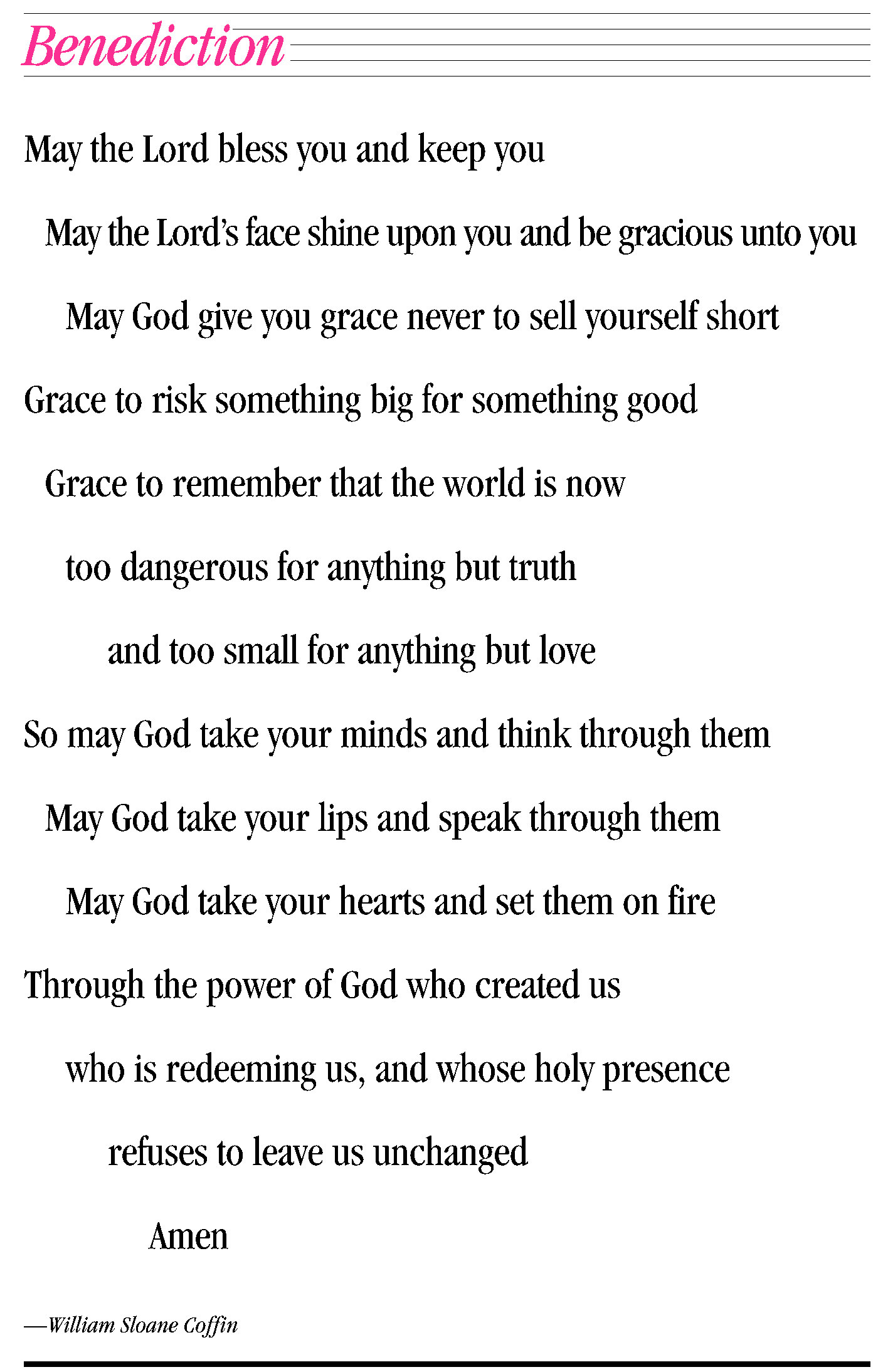¶ Invocation. Hearts open to Thy Face, like the flower to the sun / Hearts open to Thy Face, come and trace / The tears that stain our face, the joy that  shall displace / All sorrow by thy grace, mercy bound, mercy bound / All sorrow by thy grace, circle ‘round. —new verse to “What Wondrous Love Is This"
shall displace / All sorrow by thy grace, mercy bound, mercy bound / All sorrow by thy grace, circle ‘round. —new verse to “What Wondrous Love Is This"
Artwork at right ©Julie Lonneman, used with permission.
¶ One of the young people in our congregation is spending her junior year of high school as a foreign exchange student in Oman, located on the Arabian Peninsula’s southeast corner. Her blog posts have been remarkable, but a recent one is the most articulate statements I’ve seen on the struggle for intercultural understanding. She’s given me permission to share the link for that commentary.
¶ Confession. “In an unusually frank admission, Federal Bureau of Investigation Director James Comey said that American law enforcement stands ‘at a crossroads,’ acknowledging in a speech at Georgetown University that ‘There is a disconnect between police and the communities they serve. . . . All of us in law enforcement must be honest enough to acknowledge that our history is not pretty.’” —USAToday
 ¶ Remembering Marcus Borg. “It’s so easy to feel overwhelmed when we see injustice, greed and a broken world with so many needs. Sometimes it’s just too much and we become paralyzed. . . . Asked how to avoid becoming overwhelmed, theologian Marcus Borg said, ‘It’s like being part of a quilter’s group. Don’t worry about the entire quilt; just focus on your square.’” —Tom Peterson, Pick Your Issue, Thunderhead Works. Artwork at left by Tom Peterson, used with permisison.
¶ Remembering Marcus Borg. “It’s so easy to feel overwhelmed when we see injustice, greed and a broken world with so many needs. Sometimes it’s just too much and we become paralyzed. . . . Asked how to avoid becoming overwhelmed, theologian Marcus Borg said, ‘It’s like being part of a quilter’s group. Don’t worry about the entire quilt; just focus on your square.’” —Tom Peterson, Pick Your Issue, Thunderhead Works. Artwork at left by Tom Peterson, used with permisison.
¶ Also from Thunderhead Works, two laugh-out-loud, short videos spoofing the more frivolous forms of climate change activism: “Follow the Frog” and “Celebrity Brainstorm”
¶ “When the Ku Klux Klan burns a cross in a black family’s yard, prominent Christians aren’t required to explain how it isn’t really a Christian act. Most people realize that the KKK doesn’t represent Christian teachings. That’s what I and other Muslims long for—the day when these terrorists praising Muhammad or Allah’s name as they debase their actual teachings are instantly recognized as thugs disguising themselves as Muslims.” —Kareem Abdul-Jabbar, former National Basketball Association Most Valuable Player, now a New York Times best-selling author and filmmaker, in Time magazine
act. Most people realize that the KKK doesn’t represent Christian teachings. That’s what I and other Muslims long for—the day when these terrorists praising Muhammad or Allah’s name as they debase their actual teachings are instantly recognized as thugs disguising themselves as Muslims.” —Kareem Abdul-Jabbar, former National Basketball Association Most Valuable Player, now a New York Times best-selling author and filmmaker, in Time magazine
¶ In “Epidemic of Facelessness,” Stephen Marche begins by reporting that a Brit was recently sentenced to 18 months in prison for tweeting violent messages to a member of Parliament. Anyone who spends much time on the internet knows about the vicious anonymous verbal abuse and threat known as “trolling.”
Marche uses this one incident to reflect on the larger forces of facelessness in modern culture and how the phenomenon actually affects the neurological and cultural basis of the capacity for empathy. From the face “comes the sense of inevitable obligation, the possibility of discourse, the origin of the ethical impulse.”
 “Without a face, the self can form only with the rejections of all otherness, with a generalized, all-purpose contempt. . . . A world stripped, not merely of ethics, but of the biological and cultural foundation of ethics.”
“Without a face, the self can form only with the rejections of all otherness, with a generalized, all-purpose contempt. . . . A world stripped, not merely of ethics, but of the biological and cultural foundation of ethics.”
“[I]n everyday digital life engaging with the trolls ‘is like trying to drown a vampire with your own blood,’ as comedian Andy Richter put it.” But ignoring the problem gets us nowhere. “There is a third way, distinct from confrontation and avoidance: compassion. . . . Trolls breed under the shadows of the bridges we build.”
“The neurological research demonstrates that empathy, far from being an artificial construct of civilization, is integral to our biology. And when biological intersubjectivity disappears, when the face is removed from life, empathy and compassion can no longer be taken for granted.” —New York Times
¶ Many years ago, on the first Sunday following our congregation’s opening of a shelter for homeless men in our building, Pastor Mel Williams preached a sermon entitled “Naming the Poor.” He urged us all to become acquainted with these guests, getting to know them as more than “street people,” learning that behind each face was a name and a personal story. (See “Pastoral Principles for Prophet People”)
¶ Face of (whose?) God. “America is beyond power, it acts as in a dream, as a face of God. Wherever America is, there is freedom, and wherever America is not, madness rules with chains, darkness strangles millions. Beneath her patient bombers, paradise is possible.” —character in John Updike’s novel, Rabbit Redux
¶ Most of us know—from observation if not from direct personal experience—that when anonymous “issues” take on particular “faces,” minds change. For instance, in more traditional Protestant congregations, opposition to the ordination of women softens when the woman in question is homegrown, someone whose face is recognizable and respected. Similar transformations occur when mental illness strikes someone we love; or when someone known and loved comes out of the lgbt closet.
 ¶ Sam Keen’s 1991 book, Faces of the Enemy: Reflections of the Hostile Imagination, is one of a number of books documenting how a nation’s war preparations require public relations efforts (a.k.a. propaganda) to rhetorically and visually depict the enemy as barbarian, even beastly, i.e., to remove the traces of actual faces and replace them with horrific characteristics.
¶ Sam Keen’s 1991 book, Faces of the Enemy: Reflections of the Hostile Imagination, is one of a number of books documenting how a nation’s war preparations require public relations efforts (a.k.a. propaganda) to rhetorically and visually depict the enemy as barbarian, even beastly, i.e., to remove the traces of actual faces and replace them with horrific characteristics.
¶ Scientists studying infant development have long noted the importance of “face time” between infants and mothers (and fathers, too) in the child’s emotional and social development. And the more interactive the parent’s face, the more animated the infant’s.
¶ Drone warfare is but the latest technological advance that allows greater distance between the trigger of deadly force and the result of such power. Even greater anonymity is allowed. Targets are but electronic blips on a monitor, and the “pilots” located thousands of miles from the battlefield. The distinction between lethal force and the simulation of computer games is virtually eliminated. The further the face, the lessor the trace of human empathy and thus the shrinking power of grace to melt enmity and sustain community. (A host of material is available on the web, including articles by these two friends: Michael Neuroth’s “The True Cost of Drone Warfare” and Ed Kinane’s “The Ghastly, Remotely Piloted, Robotic Reaper Drones.")
¶ “If we let people see that kind of thing, there would never again be any war.” —Pentagon official defending U.S. military censors’ refusal to release video footage showing Iraqi soldiers being cut in half by cannon fire from helicopters, quoted in The Christian Century, 11 December 1991
¶ “Face” in Scripture.
•The face of the deep was the first to be exposed to the “wind of God” in the creation story. (Genesis 1:2)
•Moses’ shining face was evidence of his conversation with God. (Exodus 34:29)
•“The Lord bless you and keep you; the Lord make his face to shine upon you, and be gracious to you; the Lord lift up his countenance upon you, and give you peace.” (Numbers 6:24-26)
•God’s face is a refuge for the afflicted. “For he did not despise or abhor the affliction of the afflicted; he did not hide his face from me, but heard when I cried to him. (Psalm 22:24)
•The rejection of calculated violence: “[F]or not by their own sword did they win the land, nor did their own arm give them victory; but your right hand, and your arm, and the light of your countenance, for you delighted in them.” (Psalm 44:3)
•To seek the face of God is the road to health, wholeness and peace, for humankind and for the earth itself. (e.g., 2 Chronicles 7:14)
•The searing petition, “How long will you hide your face from me?”, is a common prayer of lament. (e.g., Psalm 13:1)
•“For now we see in a mirror, dimly, but then we will see face to face.” (1 Corinthians 12:12)
•In John’s vision of the coming holy city, where tears are dried and death is no more (Revelation 21:4), all gathered “will see God’s face, and God’s name will be on their foreheads.” (22:4)
¶ Competing texts over danger and intimacy in seeing God’s face:
•“So Jacob called the place Peniel, saying, "For I have seen God face to face, and yet my life is preserved." (Genesis 32:30)
•“[The Lord] said, you cannot see my face; for no one shall see me and live.” (Exodus 33:20)
•“Thus the Lord used to speak to Moses face to face, as one speaks to a friend.” (Exodus 33:11)
•“Never since has there arisen a prophet in Israel like Moses, whom the Lord knew face to face.” (Deuteronomy 34:10)
•“See, [God] will kill me; I have no hope; but I will defend my ways to his face.” (Job 13:15)
¶ Out of sight, out of mind. The death of your child, or one that you know, brings a convulsion of grief. The knowledge that 2.6 million children (whom we do not know) die annually from malnutrition and related diseases causes no tremor. As Soviet leader Joseph Stalin is credited with saying, “The death of one man is a tragedy. The death of millions is a statistic.”
¶ The theme song for the sci-fi movie “Avatar” is “I See You,” a phrase repeated several times in the movie. The storied Na’vi people’s language has two meanings for the verb “see.” One is the commonsensical notion of the eyes providing visual stimuli to the brain. The other is a more complex meaning, to understand or comprehend or identify with. Thus, the greeting “I see you” is more than awareness of physical presence; it conveys empathy and relationship. This is what is meant when, in the Gospels, Jesus “saw” the faith of those bringing to him a paralytic for healing, after which he said to the man “your sins are forgiven.” (Matthew 9:2, which, a verse later, Jesus explains also means “stand up and walk.”)
 ¶ The first time ever I saw your face / I thought the sun rose in your eyes / And the moon and the stars were the gifts you gave / To the dark and the endless skies, my love / To the dark and the endless skies. —Ewan McCall song, made famous by Roberta Flack’s Grammy Award winning rendition in 1972. Haven’t heard it in a while? Here’s one of several versions on the web.
¶ The first time ever I saw your face / I thought the sun rose in your eyes / And the moon and the stars were the gifts you gave / To the dark and the endless skies, my love / To the dark and the endless skies. —Ewan McCall song, made famous by Roberta Flack’s Grammy Award winning rendition in 1972. Haven’t heard it in a while? Here’s one of several versions on the web.
¶ Conflict mediators know how important it is to find resolutions that allow all parties to “save face” (avoid humiliation).
¶ Of course, trying to “save face” in the pursuit of disastrous policies, like the US war in Vietnam, leads to quagmire. As former US President Lyndon Johnson complained, “While you’re saving your face, you’re losing your ass.”
¶ A rabbi once asked his pupils how they could tell when the night had ended and the day had begun.
“Could it be,” asked one of the students, “when you can see an animal in the distance and tell whether it is a sheep or a dog?”
“No,” answered the rabbi.
Another responded, “Is it when you can look at a tree in the distance and tell whether it is a fig tree or a peach tree?”
“No,” answered the rabbi.
“Then when is it?” the pupils demanded.
“It is when you can look on the face of any man or woman and see that it is your brother or sister. Because if you cannot see this, it is still night.” —Tales of the Hasidim by Martin Buber
¶ “The face of the enemy frightens me only when I see how much it resembles me.” —author unknown
¶ Sun and moon will be replaced / With the light of Jesus' face / And I will not be ashamed / For my savior knows my name. —"All My Tears,” by Julie Miller, sung by Emmylou Harris

Featured in this issue:
•New lyrics to “What Wondrous Love Is This”
•“Acquainted with grief,” a litany for Lent
•“Pastoral Principles for Prophetic People”
©Ken Sehested @ prayerandpolitiks.org. Language not otherwise indicated above is that of the editor. Don’t let the “copyright” notice keep you from making use of material you find here (and elsewhere in this site). Reprint permission is hereby granted in advance for noncommercial purposes.
Your comments are always welcomed. If you like what you read, alert your friends. Word-of-mouth is our best (not to mention our only) publicity.

